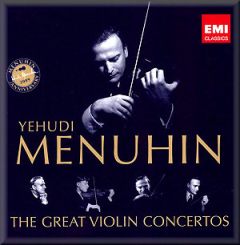Max Bruch - Violin Concerto No.1 in G minor Op. 26 (Menuhin) [1991]
Max Bruch - Violin Concerto No.1 in G minor Op. 26 (Menuhin) [1991]

I. Allegro moderato II. Adagio III. Finale (Allegro energico) Yehudi Menuhin – violin Philharmonia Orchestra Walter Susskind – conductor
Bruch wrote six substantial multi-movement works for violin and orchestra, but only this -- the first of his three official concertos -- and his Scottish Fantasy remain familiar today. Compensating for such neglect is the fact that this is one of the most popular nineteenth century concertos in the repertory, which is all the more remarkable because it was the first big orchestral work Bruch ever published. It didn't come easily to him. Bruch first sketched out the concerto in 1857, but withdrew it after its 1866 premiere. After a thorough revision based on suggestions from a number of violinists and composers, most notably the violin virtuoso Joseph Joachim, Bruch released a final version in 1868. It was premiered by and dedicated to Joachim. Although he cast the work in the traditional fast-slow-fast sequence, Bruch generated each movement in sonata form, connecting them all without pause.
The first movement, Allegro moderato, carries the subtitle Vorspiel (Prelude), a holdover from when Bruch was intending to call this a fantasy rather than concerto. A quiet timpani roll and a few disconsolate woodwind phrases set the stage for the violin's meditative entrance, a melody that rises gradually. This is all repeated a bit more assertively, until the full orchestra takes forceful control of the woodwind motif, and the violin spins out a long, impassioned theme over quivering strings and ominous timpani thuds. The second principal subject is more songful and lies lower in the violin's range, until a series of trills take it into a more ardent high register where it hovers for quite some time. The first theme is presented again, double-stops doubling its intensity. This launches the development section, a stormy sequence for the orchestra during which the violin holds its peace. In the return to the movement's opening bars, the violin's solo phrases now serve as abbreviated cadenzas. A short orchestral recapitulation-coda combo leads to the second movement.
The Adagio is a nostalgic aria for the violin. The solo writing becomes increasingly intricate, drifting into a more ardent, but less clearly defined second subject that culminates in three heaving sighs for the orchestra and then the soloist. Bruch subjects all this to a heart-on-sleeve development, deeply emotional without quite becoming mawkish. The recapitulation eases off and inserts a very brief pause before the final movement.
That's the Allegro energetico, which after a careful orchestral buildup turns out to be a joyful dance in a faintly Hungarian style (a tribute both to Joachim, who was Hungarian, and to the Joachim-influenced finale of the Brahms violin concerto). The dance theme is succeeded by some scurrying virtuosic material for the soloist and then a grand romantic melody that creates a climax of its own near the end of the exposition section. Bruch's idea of development here is largely a matter of repeating everything transposed and played at a slightly higher emotional pitch. It's the Hungarian dance that carries the concerto to an exhilarating conclusion that one could hardly anticipate from the work's gloomy beginning. ---James Reel, Rovi
download: uploaded anonfiles mega filecloud mixturecloud yandex mediafire ziddu








